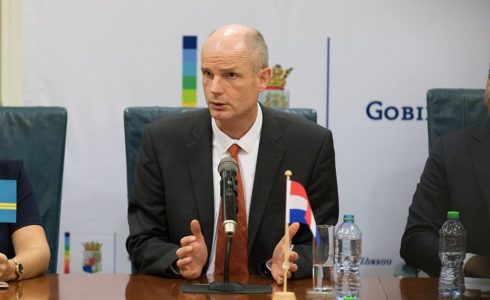
The Islamic State cannot go unpunished
At this year’s UN General Assembly, Minister of Foreign Affairs Stef Blok will convene a meeting of 20 government ministers from countries around the globe for the world’s first high-level discussion of ways to bring ISIS fighters to justice. ‘They must not be allowed to get away with the atrocities they have committed,’ Mr Blok said. The Netherlands is prepared to make the legal expertise in the Netherlands available for this purpose.
The Netherlands and Iraq will jointly host the meeting on 26 September at UN Headquarters in New York. The meeting is aimed at ensuring that ISIS fighters can be tried and held to account for their crimes. ‘Given the global impact that ISIS has had and the large number of countries directly or indirectly involved, we have no other choice than to tackle this issue together,’ the minister said. ‘The Netherlands wants to work with Iraq and other countries on steps that can be taken at national, regional and international level.’ Around 20,000 ISIS fighters are detained in Iraq, of which around 1,000 are from 50 different countries.
The New York meeting is an initiative by the Netherlands, which is one of the driving forces behind two international mechanisms aimed at collecting evidence of ISIS crimes: the UN evidence database for Syria and the UN investigation team in Iraq. ‘As soon as we have the evidence we need, it will be time for the next steps: prosecution and trial. There can be no justice unless these individuals are brought to trial.’ As a leading figure in the search for ways to prosecute and try ISIS fighters, the Netherlands is exploring various paths, together with its partners. ‘Like Amal Clooney, who is closely involved in this initiative, we want to see those guilty of war crimes and genocide in the dock. For the time being, however, the route to the International Criminal Court in The Hague is closed off, since the UN Security Council is blocking this option, and Iraq and Syria are not parties to the ICC.’
The Netherlands therefore aims to use the New York meeting to discuss the option of an international trial in the region, something that Mr Blok called for in the Security Council back in May. According to the minister, ‘Today, Iraq and the Netherlands hope to explore with other countries how we can overcome these obstacles together.’ Attention also needs to be paid to prosecutions at national level. Relevant factors include not only the location of trials, but also the need for guarantees that the death penalty will not be imposed and the importance of respecting other international standards, such as the right to a fair trial and consular assistance.
According to Mr Blok, ‘Iraq stood on the frontline of the fight against ISIS and made enormous sacrifices. So achieving justice now is everyone’s concern. This is a challenge that we, the international community, have to take up.’ The Netherlands is therefore contributing €1.6 million to Interpol in order to support the police and judiciary in Iraq with experts and biometric equipment that can help identify a large number of currently unidentified prisoners.
The minister recalled that in the cases of Rwanda, the former Yugoslavia and Kosovo it took between five and ten years to establish a court or tribunal. ‘And that’s not even counting the time it took after that for the verdicts to be handed down,’ Mr Blok added. ‘The wheels of international justice sometimes turn slowly, but they turn nonetheless. The Netherlands aims to keep up the pressure, so that justice can be achieved for the victims of ISIS.’
In New York, Minister Blok also spoke with Nobel Prize winner Nadia Murad, a young Yezidi woman who has long been imprisoned by ISIS.
Source: Government





